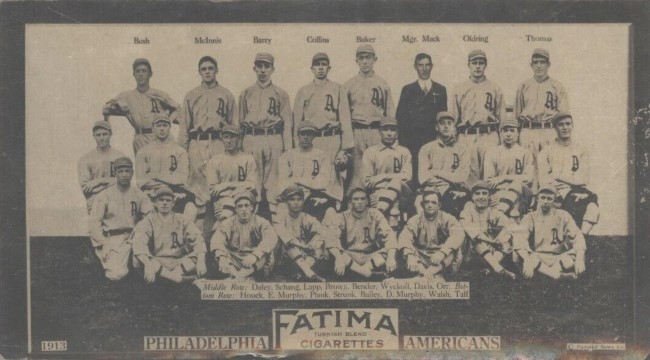
From Philadelphia, to Kansas City to Oakland – Who are the best Athletics of all-time?
The Athletics were one of baseball’s earliest teams, with history dating back over 120 years. They’ve won nine championships, including consecutive wins from 1972-74 and three out of four from 1910-13. In short, this is a franchise steeped in history and, especially with their early players, they laid the groundwork for the baseball boom in the early 1900s.
But here’s a teaser: How do you compare a charismatic OF who has more stolen bases than anyone with a turn-of-the-century, no-nonsense starting pitcher? Both played 14 years for the A’s, with WARs in the mid-70s.
Who are they, and where do they rank? Here’s the list of the top 10 all-time Athletics, and their must-have cards:
10. Frank “Homerun” Baker
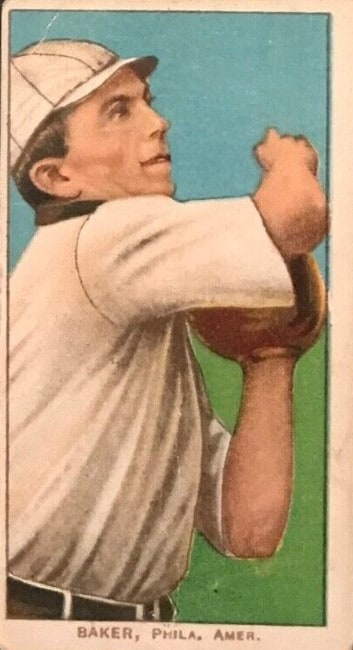
Frank “Home Run” Baker, renowned for his power hitting and stellar defensive skills, played for the Philadelphia Athletics from 1908 to 1914 and briefly in 1916. Baker earned his nickname “Home Run” for his exceptional home run hitting during the Dead Ball Era. He consistently ranked among the league leaders in home runs and RBIs during his tenure with the Athletics.
Baker’s impact on the Athletics was immense. He played a crucial role in helping the team win three consecutive World Series titles from 1910 to 1913. He was not only a reliable slugger but also a stellar third baseman. His defensive prowess and timely hitting made him an indispensable player. In 1913, he led the American League in home runs, RBIs, and slugging percentage.
Frank Baker’s legacy with the Athletics is marked by his role in bringing multiple championships to Philadelphia and his outstanding career statistics. He was inducted into the Baseball Hall of Fame in 1955.
Best Athletics card: 1909-1911 T206 White Border Frank “Homerun” Baker
The T206 set is one of the most recognizable and valuable sets of all-time, in a time period where many cards being produced were of poor quality. As with any older card, condition is an issue, and this one has only been cataloged by PSA up to an 8 grade. The card is worth approximately $2,500-$10,000 in a PSA 7 or PSA 8, or around $1,000 in poor or raw condition.
9. Vida Blue
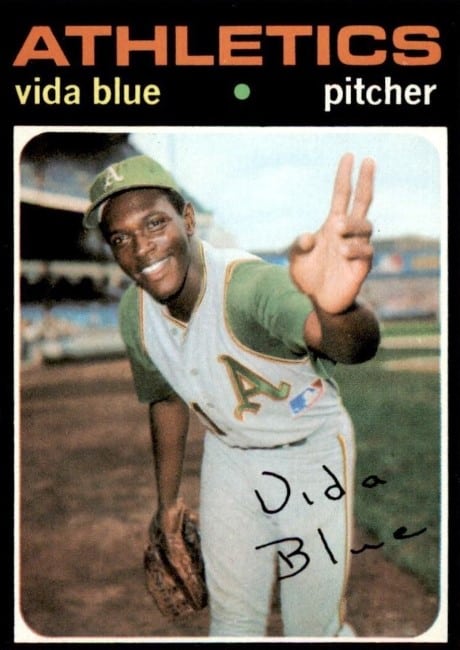
Vida Blue, a left-handed pitcher with an electrifying fastball, spent a significant portion of his career with the Oakland Athletics. He played for the Athletics from 1969 to 1977 and then returned for a brief stint in 1987. Blue’s impact on the team was immediate, earning him the American League Cy Young and Most Valuable Player awards in 1971. Blue’s remarkable 1971 season was one for the ages, as he finished with a 24-8 record, a 1.82 ERA, and 301 strikeouts.
Blue’s impressive pitching skills and individual awards played a significant role in the Athletics winning three consecutive World Series titles from 1972 to 1974. In fact, in the 1974 World Series, Blue was named the Series MVP, highlighting his pivotal role in the team’s success. He was also a six-time All-Star during his tenure with the Athletics.
Vida Blue is that he was not only an outstanding pitcher but also a versatile athlete. In high school, he was a talented basketball player and even considered pursuing a professional basketball career. However, he ultimately chose baseball and achieved remarkable success as a pitcher.
Blue’s legacy with the Athletics is defined by his incredible pitching records, awards, and his integral role in the team’s championship victories. He remains one of the most celebrated and dominant pitchers in Athletics history.
Best Athletics card: 1971 Topps #544 Vida Blue
This card sums up Vida Blue in two ways: First, it’s from his awe-inspiring 1971 season. Second, Blue is showing off his southpaw wind-up with a smile. People who met him would say that’s the type of man he was. Although this card is only worth around $50 in very good condition, fewer cards embody the spirit of one player as well as this one.
8. Reggie Jackson
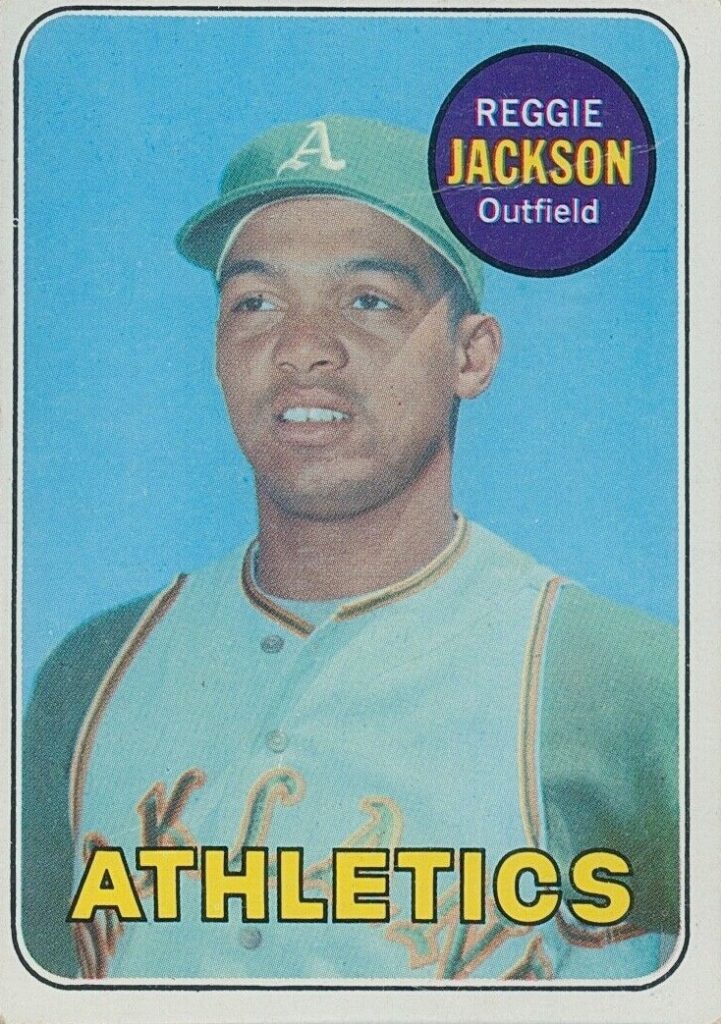
Reggie Jackson, famously known as “Mr. October” for his postseason heroics, had an impressive stint with the Oakland Athletics from 1967 to 1975. Jackson’s time with the Athletics was highlighted by his combination of power hitting and clutch performances. His prowess as a power hitter helped the A’s win three consecutive World Series titles from 1972 to 1974.
During his tenure with the A’s, Jackson was a six-time All-Star and won the American League MVP award in 1973. He was also a two-time home run champion. Perhaps his most iconic moment came during the 1973 World Series when he hit a memorable home run against the New York Mets.
Jackson’s charisma and memorable performances made him a beloved figure in Oakland. His contributions to the Athletics, both individually and as part of championship-winning teams, solidified his status as one of the franchise’s all-time greats. Reggie Jackson was inducted into the Baseball Hall of Fame in 1993.
Best Athletics card: 1969 Topps #260 Reggie Jackson (RC)
Not only is this Mr. October’s rookie card, it holds the honor of being one of the most valuable cards ever sold. The 1969 Topps set was beset by printing problems, and a rare PSA 10 of Jackson’s rookie card sold for just over $1 million in 2021.
7. Eddie Collins
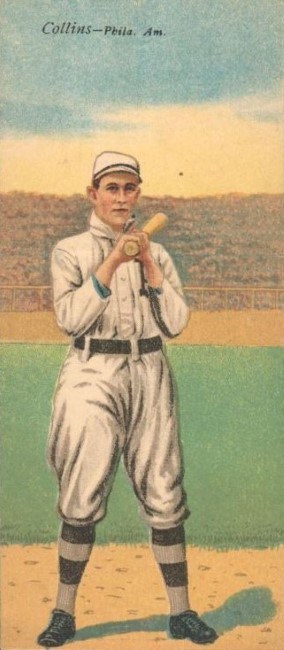

Eddie Collins, a Hall of Fame second baseman, had a distinguished career with the Philadelphia Athletics from 1906 to 1914 and again from 1927 to 1930. Collins was known for his exceptional hitting and speed on the basepaths. He led the American League in stolen bases for four consecutive seasons during his first stint with the Athletics.
Collins played a pivotal role in the success of the Athletics during the “First Dynasty” era. He was part of the team’s World Series-winning squads in 1910, 1911, and 1913. He consistently maintained a high batting average and on-base percentage, making him a reliable presence in the lineup. His stellar defensive skills at second base also earned him acclaim.
Eddie Collins was a three-time American League stolen base leader and a four-time World Series champion with the Athletics. His contributions to the team are fondly remembered as an integral part of the Athletics’ early success. He was inducted into the Baseball Hall of Fame in 1939.
Best Athletics card: 1911 T201 Mecca Eddie Collins / Home Run Baker
Since Baker was on this list already, it seems only fair to highlight a cool card they share. The T201 Mecca is a double-sided card featuring two players, and it’s designed to be folded so that either player (sharing the same pair of legs) is on the front. While folding might give heart palpitations to card purists, you have to admit the idea was cool, and it was 1911! This card can be found in graded condition for $400-$800.
6. Al Simmons

Al Simmons, a formidable outfielder and consistent hitter, played for the Philadelphia Athletics from 1924 to 1932. He was a vital part of the team’s “Second Dynasty,” contributing significantly to the A’s winning consecutive World Series titles in 1929 and 1930. Simmons was known for his exceptional batting prowess and ability to drive in runs.
During his time with the Athletics, Simmons was a two-time American League batting champion and a two-time All-Star. He consistently ranked among the league leaders in RBIs, hits, and total bases. His contributions to the Athletics’ championship-winning teams were crucial, and he was known for his clutch hitting in postseason play.
Simmons’s remarkable hitting ability and power made him a standout player during his tenure in Philadelphia. His legacy with the Athletics is marked by his key role in the team’s championship success, and he was inducted into the Baseball Hall of Fame in 1953.
Best Athletics card: 1932 U.S. Caramel #17 Al Simmons
These cards were baseball cards, but they could also be turned in for a prize. For this reason, the cards are harder to find, since many went back to the manufacturer. If you can find it, a PSA 4 will run you about $400-$600.
5. Rube Waddell
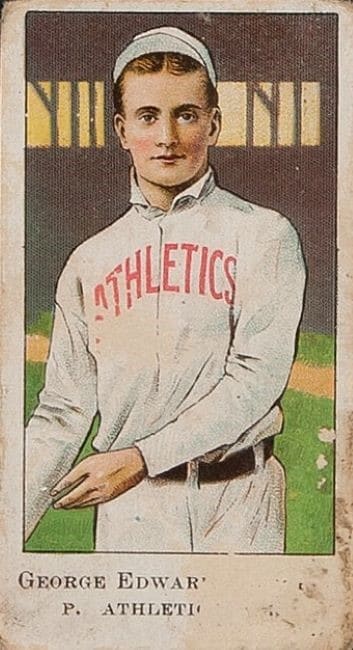
Rube Waddell, a legendary left-handed pitcher with a colorful personality, played for the Philadelphia Athletics from 1902 to 1907. Waddell was known for his incredible strikeout ability and flamboyant off-field antics. He led the American League in strikeouts in each of his six seasons with the Athletics.
Waddell was instrumental in helping the Athletics win the 1905 World Series, showcasing his dominant pitching skills. His ability to baffle hitters with his curveball and fastball made him one of the most feared pitchers of his era.
Unfortunately, Waddell’s erratic behavior was also the stuff of legend, and he was dropped by the Athletics after his sixth season on the team. By 1914, both his mental and physical health failed him, and he died at the age of 37. He was inducted into the Baseball Hall of Fame in 1946.
Best Athletics card: 1908 E91 American Caramel Rube Waddell
Waddell has only a few baseball cards from this era, and even fewer in color. He’s referred to by his given name, “George,” here. These cards are hard to find, but expect to pay around $500-$1,000 for a low-grade version.
4. Lefty Grove
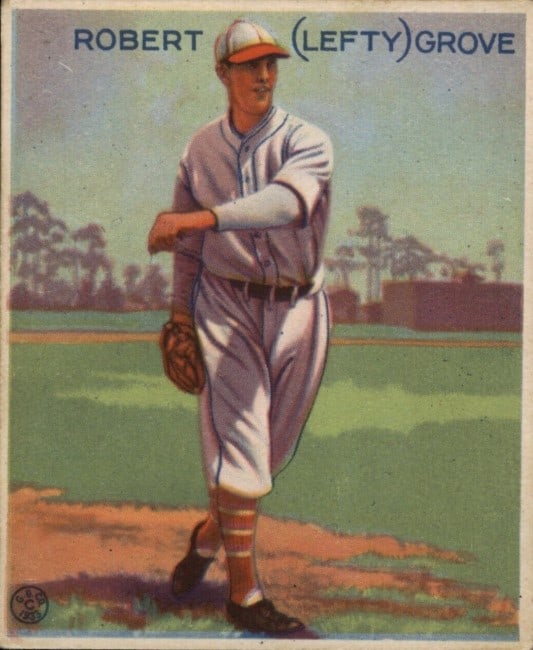
Lefty Grove, one of the most dominant pitchers in baseball history, played for the Philadelphia Athletics from 1925 to 1933. Grove was known for his exceptional control and overpowering fastball. During his time with the Athletics, he was a seven-time American League strikeout leader and a two-time American League wins leader.
Grove played a pivotal role in the Athletics’ success during the late 1920s, helping the team win back-to-back World Series titles in 1929 and 1930. His pitching dominance was a key factor in the team’s championship-winning campaigns.
Grove won the AL MVP in 1931, and the triple crown in back-to-back 1930-31 seasons. He led the AL in strikeouts seven times, and in ERA five times during his Athletics tenure. His ability to consistently overpower batters made him one of the most feared pitchers of his era.
Lefty Grove’s legacy with the Athletics is marked by his incredible pitching records, championships, and his place among the all-time pitching greats. He was inducted into the Baseball Hall of Fame in 1947.
Best Athletics card: 1933 Goudey #220 Lefty Grove
The 1933 Goudey set is legendary as one of the must-have sets of the pre-Topps era. This set is chocked full of stars, including Grove. You can expect to pay around $1,500-$3,000 for a PSA 4 on the open market but, unlike many other sets of the previous decade, this one can be found fairly easily.
3. Jimmie Foxx
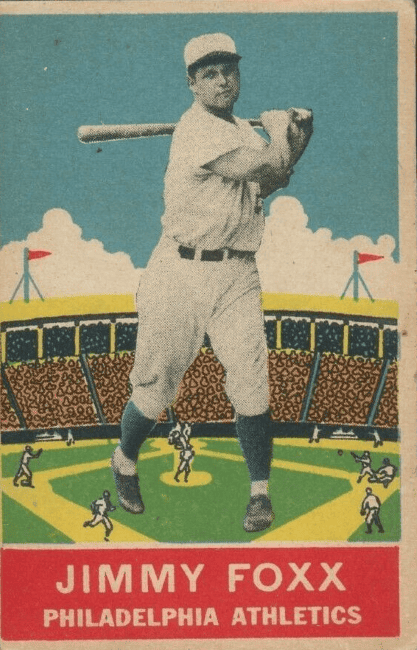
Jimmie Foxx, often referred to as “Double X” for his power hitting, played for the Philadelphia Athletics from 1925 to 1935. Foxx was a formidable presence in the lineup, known for his incredible home run-hitting ability. During his time with the Athletics, he won back-to-back American League MVP awards in 1932 and 1933.
Foxx played a crucial role in the Athletics’ success, helping the team win back-to-back World Series titles in 1929 and 1930. He consistently led the league in home runs and RBIs, earning him the Triple Crown in 1933. Foxx’s remarkable offensive skills and power hitting made him one of the most feared hitters of his era. He was also a three-time All-Star during his tenure with the Athletics.
Jimmie Foxx’s legacy with the Athletics is marked by his incredible offensive achievements, his role in championship victories, and his place among the all-time greats. He was inducted into the Baseball Hall of Fame in 1951.
Best Athletics card: 1933 DeLong #21 Jimmie Foxx
1933 was a good year for cards, but it was also the only year for the DeLong company. This was a small set, all consisting of black and white player photos on top of a four-color stadium design. Coming off an MVP year, Foxx was one of the stars of the set. Expect to pay $1,500-$3,000 for a mid-grade version.
2. Eddie Plank
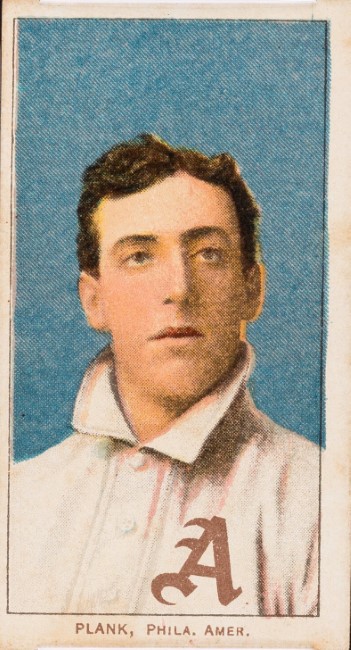
Eddie Plank, a left-handed pitching legend, had a storied career with the Philadelphia Athletics from 1901 to 1914. Plank was known for his exceptional control and the ability to pitch effectively in varied situations. He consistently ranked among the league leaders in wins and strikeouts during his time with the Athletics.
Plank played a pivotal role in helping the Athletics win their first World Series title in 1910. His pitching excellence was a key factor in the team’s championship victory, and he was regarded as one of the premier pitchers of his era. Plank’s durability and consistency on the mound made him an invaluable asset to the team.
Planks’ legacy with the Athletics is defined by his remarkable pitching records, his championship-winning contributions, and his place among the all-time great left-handed pitchers. He was inducted into the National Baseball Hall of Fame in 1946.
Best Athletics card: 1909-1911 T206 White Border Eddie Plank
The T206 is an iconic set, and within that set are the “big four” – Sherry Magee (error), Joe Doyle (error), Honus Wagner and Eddie Plank. For reasons unknown, Plank’s card is short-printed and difficult to find. There is a theory that, like Wagner, Plank was anti-tobacco and demanded that his image be removed from the set. Disputes over compensation could also be true. We may never really know. What we do know is that less than 100 are known to exist, and the best condition is a PSA 6 that is estimated to be worth $275,000. Even a PSA 1 can fetch $20,000-$40,000.
1. Rickey Henderson
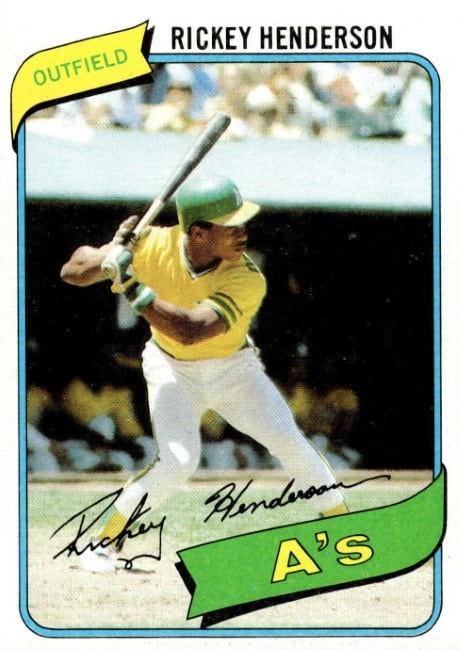
Rickey Henderson had two remarkable stints with the Oakland Athletics. He first played for the A’s from 1979 to 1984 and then returned in 1989, remaining with the team until 1993.
Henderson was known for his incredible speed on the basepaths, setting all-time records for stolen bases and runs scored. He was a game-changer both offensively and defensively. He won the American League MVP award in 1990 and was named an All-Star six times during his Athletics career.
Henderson’s ability to disrupt opposing pitchers with his base-stealing prowess and his knack for getting on base made him a dynamic leadoff hitter. He played a significant role in the A’s winning the World Series in 1989.
Rickey Henderson’s legacy with the Athletics is defined by his incredible base-stealing records, his role in a championship-winning team, and his place among the all-time greats in baseball history. He is a first-ballot hall of famer, inducted in 2009, capping off a career filled with speed, excitement, and unforgettable moments.
Best Athletics card: 1980 Topps #482 Rickey Henderson (RC)
Rickey’s rookie card is not only the most valuable of this set, but also of his entire catalog of cards. The card shows Rickey in his batting stance, with a facsimile signature at the bottom. As a modern card, prices vary widely. PSA 10s have sold at auction for between $100,000-$200,000, while an ungraded version can be had for around $50.

